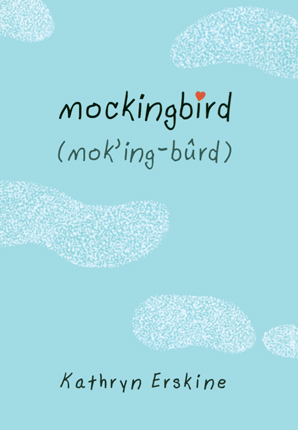Full Text Reviews: Booklist - 02/15/2010 Ten-year-old Caitlyn hates recess, with all its noise and chaos, and her kind, patient counselor, Mrs. Brook, helps her to understand the reasons behind her discomfort, while offering advice about how to cope with her Asberger’s Syndrome, make friends, and deal with her grief over her older brother’s death in a recent school shooting. She eschews group projects in class, claiming that she doesn’t need to learn how to get along with others, but solitude is neither good for her or her grieving father, and when Caitlyn hears the term closure, she turns to her one trusty friend, her dictionary, and sets out on a mission to find it for both of them. Along the way, Caitlyn makes many missteps, but eventually she does achieve the long-sought closure with great finesse, which is another of her favorite vocabulary words. Allusions to Harper Lee’s To Kill a Mockingbird, the portrayal of a whole community’s healing process, and the sharp insights into Caitlyn’s behavior enhance this fine addition to the recent group of books with narrators with autism and Asbergers. - Copyright 2010 Booklist. School Library Journal - 04/01/2010 Gr 4–6— From inside Caitlin's head, readers see the very personal aftermath of a middle school shooting that took the life of the older brother she adored. Caitlin is a bright fifth grader and a gifted artist. She also has Asperger's syndrome, and her brother, Devon, was the one who helped her interpret the world. Now she has only her father, a widower who is grieving anew and whose ability to relate to his daughter is limited. A compassionate school counselor works with her, trying to teach her the social skills that are so difficult for her. Through her own efforts and her therapy sessions, she begins to come to terms with her loss and makes her first, tentative steps toward friendship. Caitlin's thought processes, including her own brand of logic, are made remarkably clear. The longer readers spend in the child's world, the more understandable her entirely literal and dispassionate interpretations are. Marred slightly by the portrayal of Devon as a perfect being, this is nonetheless a valuable book. After getting to know Caitlin, young people's tendencies to label those around them as either "normal" or "weird" will seem as simplistic and inadequate a system as it truly is.—Faith Brautigam, Gail Borden Public Library, Elgin, IL - Copyright 2010 Publishers Weekly, Library Journal and/or School Library Journal used with permission. Bulletin for the Center... - 05/01/2010 “Devon always tells me. Now I don’t know anymore.” Such is the predicament of ten-year-old Caitlin, whose Asperger’s syndrome makes social understanding difficult, and whose staunch support in helping her negotiate human relations was her older brother, Devon. Now Devon is dead in a tragic school shooting, Caitlin’s father is mired in grief, and Caitlin is attempting to sort out this changed version of her life pretty much on her own. While autistic-spectrum disorders are a fairly common topic in children’s literature at the moment, Caitlin is a distinct personality, and the book allows her some genuinely offputting habits and mannerisms as well as making her sympathetic through her narration; underneath her protagonist’s voice, Erskine has a smooth and accessible style that keeps the story flowing. The book is rather overpacked with message, symbolism, and hackneyed emotional journeys, however, straining credulity to get everybody to resolution and to do so in a way that allows readers in on the process, and Caitlin devolves from a character into a sentimental cliché, the innocent vessel through which wisdom is conveyed. For readers who appreciate an emotional family story, however, the book offers some gentle reading on a complicated subject. DS - Copyright 2010 The Board of Trustees of the University of Illinois. Loading...
|



